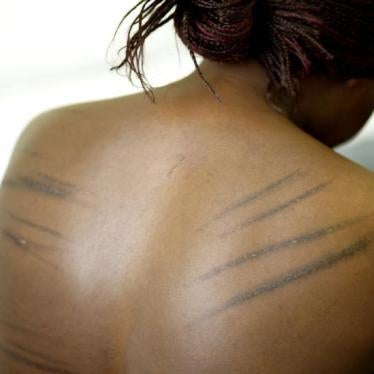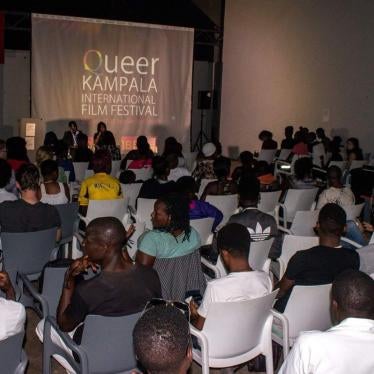Since taking office in March, Uganda’s new police leadership has begun to address the many allegations of torture by police. But its actions have yet to go far enough. Unless the police, the directorate of public prosecutions and the judiciary take more systematic actions, defendants currently detained on the basis of confessions coerced under torture could proceed through the courts and allegations of mistreatment may resurface. That would be a horrific miscarriage of justice.
The new Inspector General of Police, Martin Okoth-Ochola, has formally reinstated Nalufenya detention facility to its previous status as a regular police station. Nalufenya was notorious as a location from which detainees often came to court bearing open wounds from torture. Many of its former detainees have detailed in the press their horrendous and heinous treatment at the facility in the hands of both the police and other security outfits. Okoth-Ochola also formally disbanded the dreaded Flying Squad, a police unit also well-known for abusing suspects, and moved the commander to another post. But there has been no indication of interest in an open and transparent investigation of the numerous allegations of torture by the Flying Squad or at Nalufenya.
Much more remains to be done. Changing Nalufenya’s status without dealing with the structural and systemic abuses that occurred there amounts to little more than a superficial effort to improve the image of the police, similar to past efforts. It gives a false sense of commitment to resolving the deep institutional malaise under which Uganda’s police have operated and is a facile, public relations move.
And the Flying Squad was just the most recent of a string of police units with abusive and corrupt reputations, and followed the previously disbanded units Operation Wembley, Violent Crimes Crack Unit and Rapid Response Unit. Those units were all disbanded after public outcry over their horrific treatment of defendants and at times, of the general public. Yet the Flying Squad maintained their vicious outlook, practices, facilities and in large part, personnel.
While previous units used the Kireka detention facility in Kampala, the Flying Squad primarily used the Nalufenya facility in Jinja, alongside several “safe houses” – ungazetted places of detention where suspects were never formally registered or charged and often mistreated. In some locations Flying Squad resorted to using gazetted police stations. Suspects would be arrested, subjected to gruesome torture and handed to the police stations with an order to detain.
From our own conversations with police, we understand that some police and their commanders lived in fear of Flying Squad operatives and the extralegal means they employed. They would not enter their suspects in the crime register book, a prerequisite for detention in police cells. Suspects were often collected in the middle of the night to be tortured and returned to detention only if they survived.
Ugandan media reported recently that the Flying Squad has been reformulated into an elite squad under the name Organized Crime Department (OCD). If accurate, this is deeply worrying because giving a unit a new name but staffing it with the same personnel will change nothing. Effective and systematic vetting of all personnel recruited to the new OCD – which should include specific efforts to solicit information about their past conduct including from people currently detained in Uganda’s prisons in cases led by Flying Squad – is essential if there is any expectation that the conduct of these officers will meet the basic standards for the treatment of suspects and defendants under Ugandan or international law.
Police leadership, police professional standards officials and the director of public prosecutions will need to work together to ensure that Flying Squad personnel involved in the mistreatment and torture of suspects – or in commanding abusive operations – face individual criminal accountability. Uganda passed the Prevention and Prohibition of Torture Act (PPTA) in 2012 and it has been underused as a tool to address impunity for torture.
Okoth-Ochola faces another significant problem – the shadowy para-military outfits operating on the margins of the police that appear to have an implicit license to extra-judicially shoot, kill, torture or maim suspects. In politically-tense settings witnesses have often seen non-uniformed groups that appeared, sometimes alongside the Flying Squad, whose members would beat protestors, journalists or others. They were referred to as Kiboko Squad, and ultimately were masked men working alongside uniformed police.
In many cases witnesses said these men gave orders to police officers, who dutifully obeyed. At times journalists at the scene would capture the brutality of these masked men in broad daylight on film, but the police would deny any knowledge of who they were. However, neither did the police do anything to stop their abuses or arrest them for their unlawful behaviour.
The police leadership needs to disband all of Uganda’s unregulated paramilitary outfits including Kiboko Squad, the Boda Boda 2010, Crime Preventers and Kifeesi and other such units created by the past administration, and make this move unequivocal and public.
Okoth-Ochola and his senior commanders also need to conduct an effective, transparent investigation into these groups’ past conduct with a view to prosecuting their personnel who committed serious crimes. Recent accounts in the Ugandan media suggest that if victims are encouraged to come forward and share their experiences, there should be no shortage of witnesses for the investigators. Such an investigation would at once send a strong message by the police leadership that they disapprove of such unlawful acts and that they will not tolerate future abuses.
Finally, the discussion around the creation of a new, genuinely independent police oversight body needs to commence in earnest. The Professional Standard Unit (PSU) and the Police Disciplinary Court have demonstrated that they are unable to meaningfully hold abusive police to account. These institutions have become either avenues for to take vindictive actions against junior police officers or to circumvent criminal prosecutions by using an administrative process to deal with criminal acts. In many instances their punishments are not commensurate with the crime, making a mockery of the victims and the process itself.
Uganda’s current police leadership is undoubtedly willing to take difficult steps to reform the police. But those steps cannot be merely symbolic, but should be ones of substance that can really help ensure Uganda’s police are pro-people, non-partisan and professional force. Otherwise his reign, like that of his predecessor, will be blighted.
Nicholas Opiyo is a crusading human rights lawyer working with Chapter Four Uganda. Maria Burnett is the director for East/Horn of Africa at Human Rights Watch.








